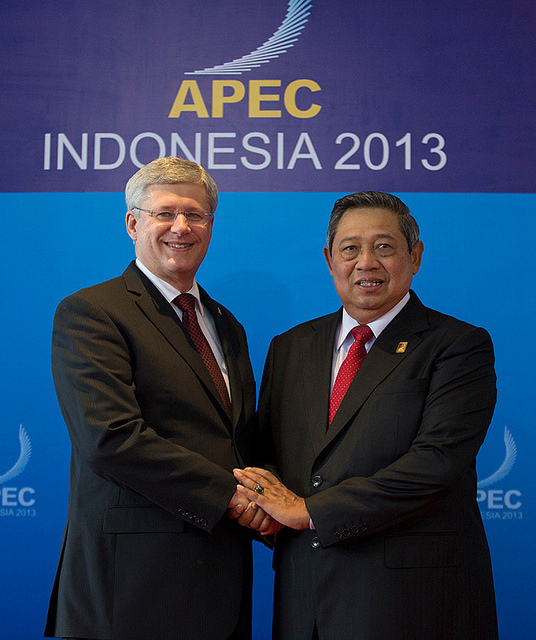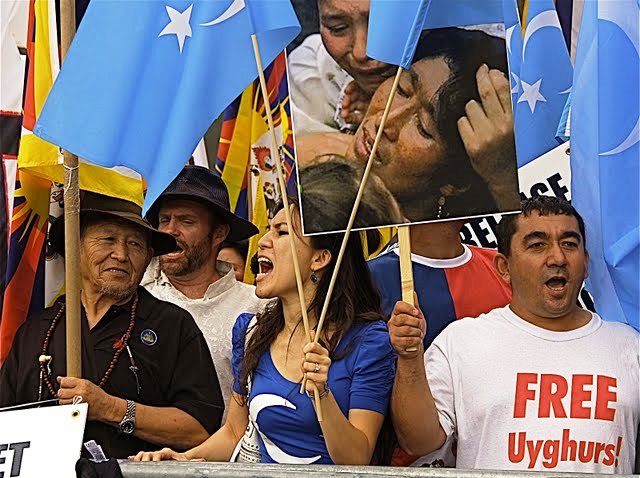The Canadian government has been criticized for turning to Asia late. Several years ago Prime Minister Stephen Harper signalled a renewed interest in relations and trade with Asia, calling it a top priority. Canada’s reputation however, obstructs its ambitions. In the best case, Canada is subject to benign neglect, in the worst case, Canada is seen as unreliable. According to Paul Evans, professor of Asian International Relations at the University of British Columbia, Canada’s presence in Asia is like “a gossamer film… Canada has virtually disappeared from screens of policy makers from Northeast Asia to Southeast Asia. They used to ask where Canada is. Now they don’t ask at all.” This certainly appeared to be the case when Prime Minister Stephen Harper arrived in Kuala Lumpur, Malaysia on October 4.
Short-term Success
It had been 17 years since a Canadian Prime Minister had visited Malaysia. Upon the Canadian delegation’s arrival however, Chinese flags still decorated the VIP arrival area. Chinese President Xi Jinping’s arrival on October 3 dominated national attention. Consequently, the Prime Minister spent October 4 touring a mosque and a maritime air base and speaking with Canadian business people. And yet, by the time Harper’s brief two days came to an end he had secured a $36 billion dollar pledge from the Malaysian government for the construction of a liquid natural gas plant in British Columbia and the pipeline to feed it. It was perfect timing.
The visit to Malaysia was envisioned merely as a stepping-stone to the APEC summit in Bali, Indonesia and a separate leaders summit. It ended up being an announcement to the international community that Canada is ready for investment at a critical moment. CIBC recently released figures showing that Canada is facing a steep decline in foreign investment, especially in the energy sector. That being said, this tentative pledge, if it materializes, is a short-term solution. More important is the success of the ambitious 12-nation free trade agreement known as the Trans-Pacific Partnership (TPP).
Canada’s Economic Future
The TPP trade agreement, which would link the economies of 12 nations lining the Pacific Rim, if settled this year as projected, will be the largest trade deal in the world. The TPP agreement, as a paper presented by the Fraser institute illustrates, offers an opportunity for Canada to reach its trade objectives and energize its sluggish economy.
To begin with, Canada’s primary trading partners, the US and Western Europe, are experiencing slow growth. The TPP would give Canada access to the markets of fast-growing economies. In contrast to Canada’s own aging population, many of its new trading partners have young populations, thus an increasing consumer base. Furthermore, being at the TPP table gives Canada the opportunity to shape the rules that will characterize trade in the Asia-Pacific. Finally, it will increase certainty and reduce risk for Canadian companies investing or trading with TPP members. The agreement would essentially generate greater economic prosperity for all of its members. Specific to Canada, the TPP would in all likelihood herald a strengthening of relations with Asian nations and would thus potentially open the door for Canada to attend significant political gatherings. This, it will be argued, is critical for Canada to reclaim its middle power status in the Asia-Pacific region.
Canada’s Climb Back to Middle Power Status
‘Middle powers’ is a useful category to describe mid-sized nations that engage in international compromises and multilateral solutions to encourage reform and change. Canada portrayed itself as the prototypical middle power in Asia in the 1970’s to the 1990’s. It actively participated in ASEAN Plus dialogues and the founding of the ASEAN regional forum (ARF) and APEC. After the 1997 APEC Summit in Vancouver however, engagement in Asia stalled. While other nations, notably Australia, continued to cultivate strong regional ties and participated in organizations, Canada through its disinterestedness unwittingly enabled the deconstruction of its identity as a middle power in the region.
Canada was never a ‘giant’ in the international community. However, it was a deft dancer, a middle power that strategically embraced multilateralism to further its policy goals. Canada can free itself of its diminishing profile and reclaim this status. Despite the current government’s failed attempts at strengthening bilateral ties with Asian nations, inclusion in a comprehensive multilateral agreement offers Canada the opportunity to reposition itself within a larger global rebalancing. In other words, the TPP would guarantee Canada’s constructive and consistent engagement with the economies of Asia and thus help rebuild Canada’s image as a middle power in the region. Evidently, the potential returns and opportunities accompanied with the TPP are high. So is the cost of mishandling this economic and political opening: Canada would be left further and further behind.




